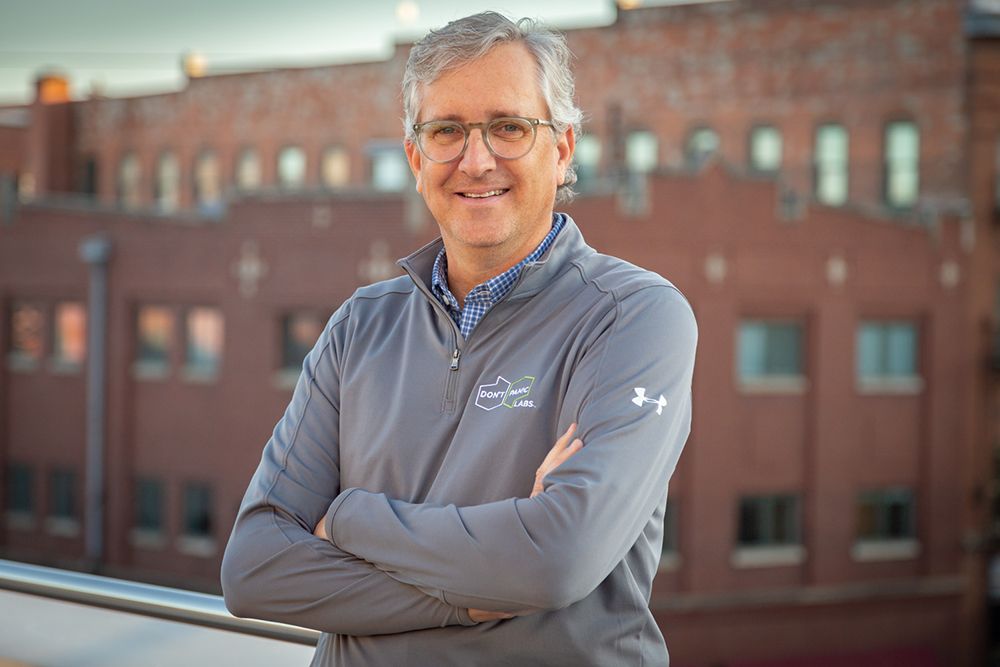Calendar Icon
Oct 15, 2020
Person Bust Icon
By Phil Carter
![]() RSS
Submit a Story
RSS
Submit a Story

When Doug Durham was young, evaluating his opportunities for college, he decided on electrical engineering. Not because he grew up wanting to be an electrical engineer, but because it seemed mysterious.
"I didn't really know what an electrical engineer did," said Durham, a 1988 UNL College of Engineering graduate. "I picked it because I thought it sounded exotic and was something I knew nothing about. Today, new engineering students take a class that delves into the different engineering professions, very first semester. I could have used that!"
It turned out to be a solid choice, because engineers solve complex problems, and that core way of thinking served as the foundation for all of his jobs that followed.
Durham's career experiences have been diverse, but remained engineering-focused. As CEO of Don't Panic Labs, Durham and the company help other companies innovate through the design and development of software technologies. Since 2010, Don't Panic Labs, which is part of Nebraska Global Investment Company, has helped build and launch businesses like Beehive Industries, EliteForm, and Ocuvera, helping these companies integrate software and hardware technologies into products that impact the lives of customers through innovation.
"I think it's an advantage to have an engineering background," Durham said of helping to build long-term software companies. "That's significant when it comes to the complexity of the problems we're trying to solve today."
Durham's career path coming out of college was uncertain as there were very few electrical engineering jobs to be had in Nebraska when he graduated from UNL. With three job offers in hand following graduation day, and all of them out of state, he chose the location closest to friends and family, and one that would further nurture his love of baseball: St. Louis.
"I'm a huge baseball fan," Durham admitted with a laugh. "McDonnell Douglas had a job in St. Louis, and I love the Cardinals. It turned out to be a great opportunity for me as it gave me the experiences I have relied upon throughout my career. This job also needed a security clearance, furthering the intrigue."
That position allowed Durham to work on military aircraft, which he did for seven years as an avionics systems engineer. One of the first projects he worked on was the YF-23 fighter plane. His last assignment was on the F-18 program. It was the continuation of a long-running interest in military planes for Durham.
"Aviation was always of interest to me," added Durham, who served as an engineering liaison officer with the Air National Guard for 20 years. "I joined the Nebraska Air National Guard during college to help pay my tuition. Eventually I was selected to attend navigator school for the RF-4C reconnaissance planes the unit in Lincoln was flying at the time. I ended up graduating and taking the position at McDonnell Douglas before I was able to attend the training. There were many roles that followed over the years, but one of my last assignments required that I learned CAD, while serving as a design engineer in Afghanistan, which gave me deeper exposure to other engineering fields like civil and mechanical."
After seven years with McDonnell Douglas, Durham and his wife, Shana, returned to Nebraska where he eventually went to work for Valmont Industries in Valley. Durham enjoyed his job at the irrigation manufacturer, but living in Lincoln and commuting to Valley had its disadvantages, so he followed his instincts again and discovered a unique opportunity to work in a garage startup in Lincoln. The company was MindVision Software, where Durham developed a long-term partnership with the company's owner, Steve Kiene.
"It was a very small operation, around 12 people, but it was an innovative place to work," explained Durham, who ultimately led product development for the company. "This was 1999 and we were building an e-commerce software platform that allowed people to purchase software from within the applications itself, which was a novel thing back then."
The rapid growth of MindVision led to the company being bought out by a Minneapolis-based competitor in 2006, which sparked an interest in Durham to build and launch software development companies in Lincoln.
"Lincoln embraces agility and people in the community aren't afraid to adapt to changing times," added Durham, who co-founded Nebraska Global in 2010 to foster startup software companies and develop a software tech ecosystem in Lincoln. "Our goal was providing interesting jobs for our graduates and bringing economic growth to our state."
Some of the companies grown by Nebraska Global and aided by Don't Panic Labs include Beehive Industries, a public utilities software company; EliteForm, a company that measures athlete training and performance through computer vision technology; and Ocuvera, a company utilizing artificial intelligence and computer vision to help prevent patient falls in hospitals. According to Durham, these companies, and many more, will succeed because of determined people willing to take risks and embrace the unknown.
Durham's diverse career is the result of continually evaluating opportunities.
"When a new idea or opportunity crosses my path, I have a decision-making process. I ask myself, will I regret not trying this? Keeping an open mind is something I've always tried to do," said Durham. "My kids have heard this advice many times."
His son, Parker, recently graduated (2019) from the UNL College of Engineering as a mechanical engineer and daughter Molly is a senior biology major at UNL. His son Jake just began his freshman year as a mechanical engineering major at UNL. They are fourth-generation Huskers.
"I tell them that regrets are hard to deal with and should be avoided. I'd rather work on a job and fail at it, than look back and say, 'I sure wish I would've tried that.'"
Submit a Story